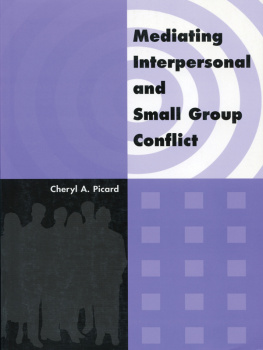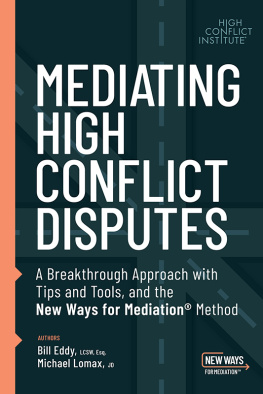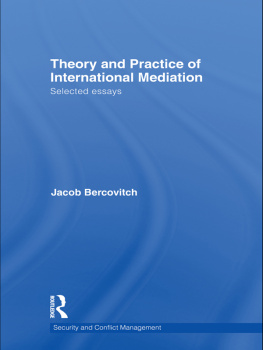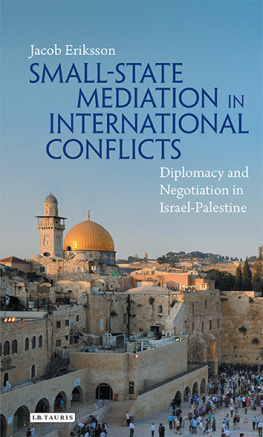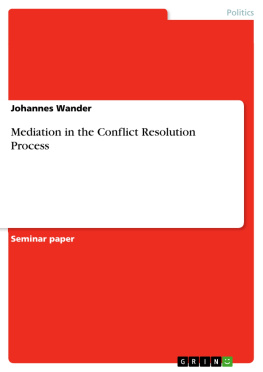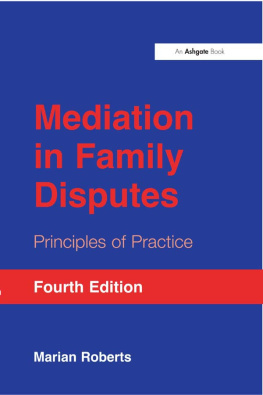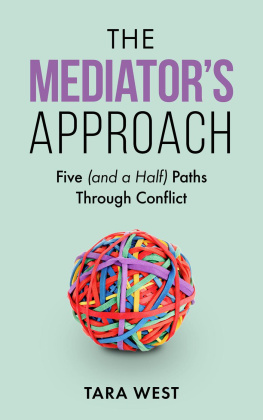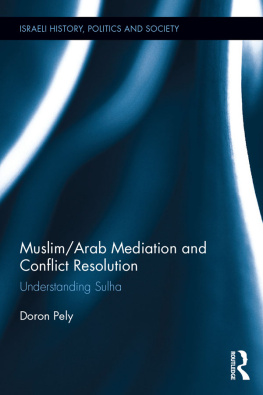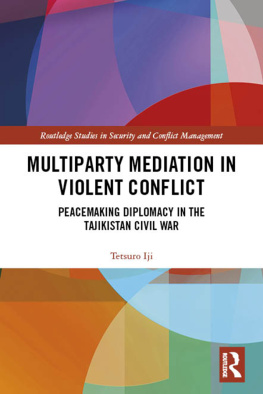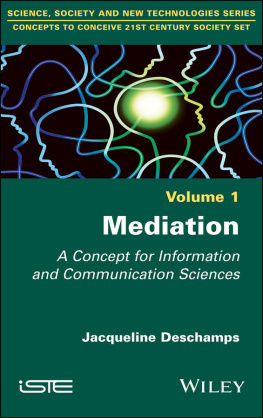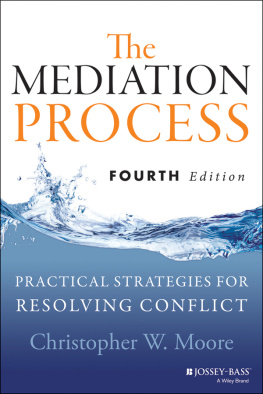Picard - Mediating Interpersonal and Small Group Conflict
Here you can read online Picard - Mediating Interpersonal and Small Group Conflict full text of the book (entire story) in english for free. Download pdf and epub, get meaning, cover and reviews about this ebook. City: Ottawa [Ontario, year: 2015;2014, publisher: Dundurn;Golden Dog Press, genre: Politics. Description of the work, (preface) as well as reviews are available. Best literature library LitArk.com created for fans of good reading and offers a wide selection of genres:
Romance novel
Science fiction
Adventure
Detective
Science
History
Home and family
Prose
Art
Politics
Computer
Non-fiction
Religion
Business
Children
Humor
Choose a favorite category and find really read worthwhile books. Enjoy immersion in the world of imagination, feel the emotions of the characters or learn something new for yourself, make an fascinating discovery.
- Book:Mediating Interpersonal and Small Group Conflict
- Author:
- Publisher:Dundurn;Golden Dog Press
- Genre:
- Year:2015;2014
- City:Ottawa [Ontario
- Rating:4 / 5
- Favourites:Add to favourites
- Your mark:
- 80
- 1
- 2
- 3
- 4
- 5
Mediating Interpersonal and Small Group Conflict: summary, description and annotation
We offer to read an annotation, description, summary or preface (depends on what the author of the book "Mediating Interpersonal and Small Group Conflict" wrote himself). If you haven't found the necessary information about the book — write in the comments, we will try to find it.
Picard: author's other books
Who wrote Mediating Interpersonal and Small Group Conflict? Find out the surname, the name of the author of the book and a list of all author's works by series.
Mediating Interpersonal and Small Group Conflict — read online for free the complete book (whole text) full work
Below is the text of the book, divided by pages. System saving the place of the last page read, allows you to conveniently read the book "Mediating Interpersonal and Small Group Conflict" online for free, without having to search again every time where you left off. Put a bookmark, and you can go to the page where you finished reading at any time.
Font size:
Interval:
Bookmark:

Mediating Interpersonal and Small Group Conflict
New Edition: Revised and Updated
Cheryl A. Picard

2002 by Cheryl A. Picard
ISBN # 0-919614-99-X
All rights reserved. No part of this publication other than in brief form for review or scholarly purposes may be reproduced, stored in a retrieval system, or transmitted, in any form or by any means, electronic, mechanical, photocopying, recording or otherwise, without the prior permission of the copyright holders.
National Library of Canada Cataloguing in Publication
Picard, Cheryl Ann.
Mediating Interpersonal and small group conflict/Cheryl Ann Picard. --Rev, and updated
ISBN # 0-919614-99-X
1. Conflict management. I. Title.
HM1126.P52 2002 303.69 C2002-902233-9
Printed in Canada.
Layout and Cover Design: The Gordon Creative Group of Ottawa.
Illustrations by Michelle Sutherland.
The Golden Dog Press wishes to express its appreciation to the Canada Council and the Ontario Arts Council for current and past support of its publishing programme.
Table of Contents
Preface
The second edition of this book builds upon the information and skills contained in the first edition. Revisions reflect advances in my own thinking and comments from those who have used this book. Information about the mediation process has been enhanced and includes sample dialogues, as well as additional information on convening a mediation session. The list of national associations has been updated and a list of Canadian higher education training institutions added.
Mediating Interpersonal and Small Group Conflict explores the theory and practice of the first mediation. The book is organized into two distinct sections: the first dedicated to the major theoretical tenets of mediation, the second to the practice, skills, and strategies used by mediators.
Chapter one discusses the nature of conflict, various conflict styles, the continuum of conflict resolution, as well as the growth and critique of alternative dispute resolution. Chapter two is an overview of mediation theory. It examines the rise of the mediation movement, various ideologies and approaches to mediation, the process of mediation and role of a mediator, along with some of the issues and trends currently facing the mediation community. Chapters three, four, and five highlight the practice elements of mediating interpersonal and small group conflict. Chapter three contains an overview of the key elements of conflict assessment and management. Chapter four describes many of the communication skills used by mediators including reflective listening, effective questioning, reframing, immediacy, bridging, and confronting. In Chapter five, mediation techniques and processes are outlined. Some of these include: conducting an intake, collecting background information, identifying interests, managing the emotional climate, writing agreements, calling a caucus, co-mediation, and hallmarks of an advanced practitioner.
The strategies discussed in this book are based on my learning and personal experience as a mediator over the last twenty-five years. However, the ideas and skills are not mine alone. The study of conflict and mediation is a burgeoning field and many of the topics and suggested practices found in this book are described in other texts. I have included a list of popular Canadian and American books in the back of the book under the heading Suggested Readings.
The content of Mediating Interpersonal and Small Group Conflict reflects both my mediation model of choice and personal values which I want to make explicit. I believe that mediation has the potential to empower individuals to achieve greater insights into the cares, concerns, interests, and values that are at work in conflict both their own and those of other parties, as well as insights into the relations that connect them. I believe that individuals have the inner resources to solve their own conflicts and are best placed to do so. I also believe mediation has the power to transform oppressive social institutions. And, I believe in most cases mediation is a better dispute resolution process than litigation or other adversarial processes. I identify myself as a relational mediation practitioner which means that I believe individuals are interconnected and possess the capacity for concern of self and others. My style of mediation is facilitative and largely non-directive, reflecting the principles of self-determination and empowerment. I refer to the model of mediation that I practice and teach as insight mediation.
This book has been a long time in the making. That it is being published now is to the credit of a number of individuals. Firstly, recognition must be given to those who have permitted me to mediate and learn from their efforts to reach understanding and empowerment. Secondly, I am indebted to all those who have been my students. Each of you have helped me to become a better teacher and a more reflective practitioner. Thirdly, I have been stimulated to examine the conceptual issues in the field of mediation by many of my colleagues and by my doctoral work. Finally, and most importantly, I want to acknowledge my family without whose support and encouragement I would not have ventured into this wonderfully rich and diverse profession.
The Theory
Chapter 1:
Conflict Theory
Conflict is an inevitable, pervasive, and important aspect of social life. It is a relational concept that involves the interaction of people or groups in society. Conflict is generated by differences in ideas, values, and beliefs. Although a familiar part of our existence, conflict has contradictory forms, processes, and outcomes. On the one hand, it can serve to enhance relations, increase productivity, and create new understandings. It helps to clarify and reinforce societal standards and provide an opportunity, for growth and moral development. On the other hand, conflict can create dysfunction and disorder in society, destroy relationships, and cause pain. The central assumption of conflict theory is that it has personal and social value that it is functional for society (Coser, 1956). The study of conflict has been undertaken by a range of disciplines; its resolution has become the fascination of a diverse group of psychologists, sociologists, economists, and game theorists. The result is a field of study and practice that is both rich and stimulating.
The central assumption of conflict theory is that it has personal and social value.
History
Classical thinkers such as Plato and Aristotle viewed conflict as a threat to the success of the state, a view which led to the belief that conflict needed to be kept to a minimum, if not totally eliminated.Cosers book, The Functions of Social Conflict, published in 1956, is often cited as the cornerstone of current theories of social conflict. Coser positions conflict as a constructive form of socialization and posits that a certain degree of conflict is an ally in the formation and satisfactory continuation of group life.
Defining Conflict
There is no one definition of conflict. Deutsch defines conflict as existing whenever incompatible activities occur (1973:10). Coser gives a fuller explanation; conflict is a struggle over values or claims to status, power, and scarce resources, in which the aims of the conflicting parties are not only to gain the desired values but also to neutralize, injure or eliminate their rivals (1968:232). Himes suggests that the way to approach the question of social conflict is to focus on the struggle between the actors. He defines conflict as the purposeful struggles between collective actors who use social power to defeat or remove opponents and to gain status, power, resources and scarce values (1980:14). Finally, Hocker and Wilmot define conflict as an expressed struggle between at least two interdependent parties who perceive incompatible goals, scarce resources, and interference from others in achieving their goals (1995:21).
Next pageFont size:
Interval:
Bookmark:
Similar books «Mediating Interpersonal and Small Group Conflict»
Look at similar books to Mediating Interpersonal and Small Group Conflict. We have selected literature similar in name and meaning in the hope of providing readers with more options to find new, interesting, not yet read works.
Discussion, reviews of the book Mediating Interpersonal and Small Group Conflict and just readers' own opinions. Leave your comments, write what you think about the work, its meaning or the main characters. Specify what exactly you liked and what you didn't like, and why you think so.

